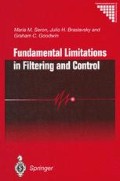Abstract
Periodic dynamical systems frequently arise in applications. Examples include batch processes that are taken through a periodic operating cycle, and systems where periodic or multirate sampling strategies are employed (Feuer & Goodwin 1996). A periodic system is time-varying in nature; however, by using time or frequency domain raising techniques, it is possible to reduce the analysis to that of a special LTI multivariable system.
Access this chapter
Tax calculation will be finalised at checkout
Purchases are for personal use only
Preview
Unable to display preview. Download preview PDF.
Notes and References
This chapter is mainly based on Goodwin & Gómez (1995).
Frequency Domain Raising
The origins of this tool can be related to early work of Zadeh (1950), who gave a frequency domain description of general time-varying systems. The modulation representation has been extensively used in the signal processing literature, see e.g., Shenoy, Bumside & Parks (1994), Vetterli (1987) and Vetterli (1989).
The modulated transfer matrix, when evaluated along the unit circle, is sometimes referred to as the alias component matrix (Smith & Barnwell 1987, Ramstad 1984, Vetterli 1989).
Time Domain Raising
For a description of time domain raising and its utility see e.g., Khargonekar, Poolla & Tannenbaum (1985), Meyer (1990), Ravi, Kharghonekar, Minto & Nett (1990) and Feuer & Goodwin (1996). This latter reference establishes the relation between time and frequency domain raising.
Transform Techniques
For a more detailed exposition of Fourier techniques see e.g., Feuer & Goodwin (1996). The double-sided Z-transform and its properties is studied, for example, in Franklin, Powell & Workman (1990).
Periodic Control of LTI Systems
Khargonekar et al. (1985) argue that, for an important class of robustness problems, discrete periodic compensators are superior to time-invariant ones. This superiority is explained in terms of improved gain and phase margins. Similar ideas are presented in Lee, Meerkov & Runolfsson (1987) for continuous-time systems, and in Francis & Georgiou (1988) for sampled-data systems. On the other hand, Khargonekar et al. (1985) showed that time-varying controllers offer no advantage over time-invariant ones in the problem of weighted sensitivity minimization. Furthermore, in Shamma & Dahleh (1991) it is argued that time-varying compensation does not improve optimal rejection of persistent bounded disturbances, and also it does not help in the bounded-input bounded-output robust stabilization of time-invariant plants with unstructured uncertainty.
An analysis of the use of periodic controllers, based on frequency domain arguments, has been given by Goodwin & Feuer (1992) and Feuer (1993). These works showed that the use of periodic control faces two problems: inherent presence of high frequency components, and sensitivity to high frequency system uncertainty.
Author information
Authors and Affiliations
Rights and permissions
Copyright information
© 1997 Springer-Verlag London Limited
About this chapter
Cite this chapter
Seron, M.M., Braslavsky, J.H., Goodwin, G.C. (1997). Extensions to Periodic Systems. In: Fundamental Limitations in Filtering and Control. Communications and Control Engineering. Springer, London. https://doi.org/10.1007/978-1-4471-0965-5_5
Download citation
DOI: https://doi.org/10.1007/978-1-4471-0965-5_5
Publisher Name: Springer, London
Print ISBN: 978-1-4471-1244-0
Online ISBN: 978-1-4471-0965-5
eBook Packages: Springer Book Archive

